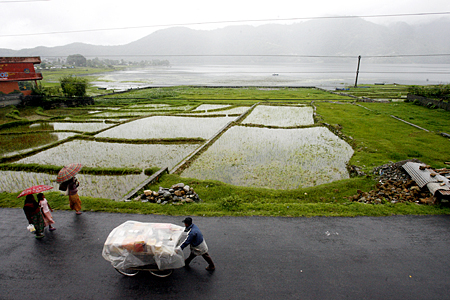Life in Pokhara
Pokhara feels a world away from Kathmandu, and is a welcome reprieve from the hustle and bustle found there. In Pokhara I am free to walk the streets without worrying about being honked at constantly or hit by the occasional stray side view mirror. It has rained each day that I have been here (as it had been in Kathmandu), though the rain in Pokhara elicits different feelings than in Kathmandu or back home in California.
In California, rain brings thoughts of overflowing storm drains and nets filled with trash along the LA river. In Kathmandu, rain means flooded streets, less than safe drinking water, and countless motorcycle riders patiently waiting under awnings and in shop doors for the rain to subside, a burden more than a pleasure. In Pokhara, right or wrong, rain reminds me of life and of the corn, beans, and rice I can see growing all around me. There is a great deal of peace to be had sitting on a balcony overlooking Phew Lake.

In California, rain brings thoughts of overflowing storm drains and nets filled with trash along the LA river. In Kathmandu, rain means flooded streets, less than safe drinking water, and countless motorcycle riders patiently waiting under awnings and in shop doors for the rain to subside, a burden more than a pleasure. In Pokhara, right or wrong, rain reminds me of life and of the corn, beans, and rice I can see growing all around me. There is a great deal of peace to be had sitting on a balcony overlooking Phew Lake.

Technorati Tags:



